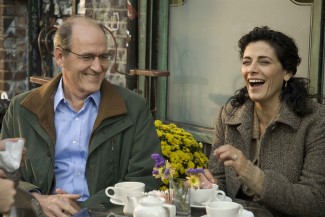The Visitor (Tom McCarthy, 2008): USA
Reviewed by Darryl Walden. Viewed at the Santa Barbara Film Festival 2009.

The Visitor, written and directed by Tom McCarthy, is an unsung, yet, engaging drama that operates as a prescription for rediscovering the self. A pure and simple anecdote to combat depression is opening up to human interaction which often works better with complete strangers. This is what happens to Walter Vale (Richard Jenkins), a college professor in Connecticut and recent widower, who is also estranged from an only son that was closer to his mother.
To expose Walter’s depression, McCarthy deftly crafts a scene where Walter morosely engages in a piano lesson which we come to understand is a pitiful attempt to revive some sense of identity that is attached to the memory of his wife, an accomplished pianist who had always criticized his playing as does the instructor (Marian Seldes) during the lesson.
Compounding his feelings of ineptness, Walter is ordered, as a mercy to preserve his tenure, to make presentation of a paper on global economics to the UN in New York. Walter attempts to avoid the assignment, and in doing so, reveals that while he shares credit of the paper with someone else, it was the co-writer’s intellectual property; he merely signed off on it at a time when his name had greater credibility. This excuse is rejected.
Arriving in New York, Walter discovers two illegal aliens and apparent victims of a rental scam, living in his apartment. Harboring some in-trepidation, Walter still invites the couple Tarek Khalil (Haaz Sleiman), a young Syrian conga player and his Senegalese girlfriend, Zainab (Danai Guriri), a street vendor who sells handmade jewelry, to stay with him. It symbolizes an initial step toward trusting in his judgment again which proves true as Tarek and Zainab reveal themselves to be decent human beings.
Where Walter is reserved, Tarek is infectiously charismatic and patient, certainly when it came to teaching Walter the rudiments of playing the conga. Tarek instructs, “Do not think. Feel the rhythm of the beat.” Walter is as fascinated with the drum as he is with the serendipitous friendship he has entered with Tarek.
We are dismayed when Tarek is arrested by immigration authorities and faces deportation, and Walter becomes enraged at post 9/11 alarmist fears that govern unfair immigration policies. Indeed, in an incarcerated conversation with Walter, Tarek laments, “This not fair. I’m not a criminal. I have committed no crime. Do they think I’m a terrorist? There are no terrorists here. They have money and support.” How perfect is that for powerful, insightful dialogue ?
Tarek’s mother, Mouna (Hiam Abbass), joins Walter at the apartment and the legal struggle to prevent Tarek’s deportation. Through it, Walter is briefly reacquainted with the art of courtship.
Following the screening, I ran into classmate William Conlin and his parents inside the lobby of the Metro 4. Through no fault of our own, we enacted our own open panel discussion of this film that even drew enthusiastic looks from observing Metro Theater staff.
“He should have married her,” cried William’s mother. “Yes, that would have solved the illegal immigration issue, ” I intoned. “No…he was still too emotionally stagnant to have made that leap so soon,” said William’s father. “But that would have been perfect for him…a way for him to start ‘A Third Chapter,’ just as Sara Lawrence Lightfoot says in this article,” a lady near us passionately interjected, waving the article in her hand as testimonial evidence. Her husband, in good humor said, “What she really means is that she can’t wait for me do die so she can start her own third chapter.” Everyone laughed. Then William nodded his head, concluding, “Now I understand why this film got Academy nominations.”
About this entry
You’re currently reading “The Visitor (Tom McCarthy, 2008): USA,” an entry on Student Film Reviews
- Published:
- 02.08.09 / 2pm
- Category:
- Films, Santa Barbara Film Festival 2009
1 Comment
Jump to comment form | comments rss [?] | trackback uri [?]